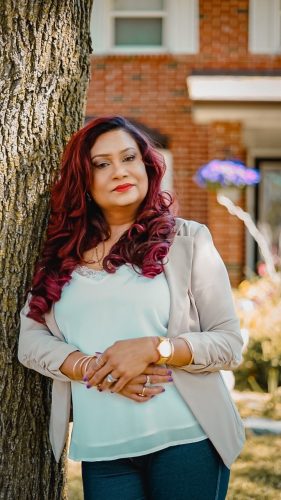Sandy Shobha Maeck is a mother of four with a story of resilience and perseverance that weaves through the terror of domestic violence and a relationship based on lies to happiness.
Today all of her children are adults and while her story has not ended Maeck, a Canada-based Guyanese, has chronicled her life from Guyana to Canada and domestic and sexual abuse in a marriage that was arranged by her parents.
However, even as she attempted to share her story she had to step carefully as some whose lives were once intertwined with hers sent her lawyers’ letters. She was forced to write part of The Unwanted Wife, her autobiography, as fiction.

As she chatted with Stabroek Weekend via Zoom recently, Maeck was still very careful. She related that there are still some aspects of her past life that send shivers down her spine. Looking back, she pointed out that it was because her ex-husband’s family was being investigated that she was able to escape the marriage, as initially her reports of domestic violence were not taken seriously. Her ex-husband, she said, made sure he hit her where there would be no marks.
She recalled that she had known her ex-husband when he was a child in Guyana before he left for Canada, but not as an adult. Therefore, he was a stranger when they wed.
“I met him [as an adult] on a Thursday and then we got married on a Saturday and then he left about a week and a half after that and so it was very awkward,” she said. That was in 1984.

It was not only awkward but unpleasant, she recalled, “getting married and sleeping with somebody that you don’t know or care for, it wasn’t a nice situation at all”. It was at the Tower Hotel she spent her ‘honeymoon’ and she remembered sitting at the window and looking at the National Library.
Over the next year, she communicated with her husband via telephone, but her family did not have a phone and she had to visit a relative’s home, where she spoke to him in the presence of others.
“It was the most awkward thing, like what do you say when everybody is sitting there and like listening to you,” she said with a little laugh, adding that while they did write letters and send cards, they never got to know each other.
The following year, she left Guyana for Canada and moved into her in-laws’ home, where her husband lived. She was 19 years old and it took some time to adapt as not only did she not know her husband, she also did not know his family.
Initially, there was no physical abuse, Maeck said, but there was control, as she had to follow everything her husband or his family said, inclusive of what she wore and where she went.
“At that time I thought it was normal. I didn’t know any different…,” she said, recalling that growing up in Georgetown she was not allowed to have any friends and whenever she went out it was with her family so initially she saw nothing wrong with her every move being controlled.
She described her marriage, which was characterized by emotional distance from her husband, as a “duty to each other… even like when we would have sex it would be like a duty. It would be like a planned thing…
“It was not love… It was just that we had to do what we had to do and then we started getting pressured to have children from both our parents…”
Within three years of her being in Canada, her family also moved there; she had her first child and she continued to follow the rules.
“I wanted to work and they said no. And then I said, ‘Oh I want to go to school’ and they said no,” she shared.
Eventually, she did get to continue her studies but prior to that her husband became more controlling, attempting to prevent her from visiting her family and taking her child to see them. When he allowed it, he insisted on accompanying her and then would ensure that they left at a certain time.
‘It just got worse’
“It just got worse from that,” the domestic violence survivor said.
The physical abuse had started after she had her first son, and initially her husband only hit her in the stomach and away from everyone else. The first instance, she recalled, was one day when she wanted to visit her family.
The abuse continued and Maeck said she did call the police but when they turned up, her in-laws denied it happened.
“It was my word against about eight other people saying that he never hit me or he never touched me and that I was the one who hit him. Back then, you had to have proof and you had to have witnesses and all of that. Now if somebody calls the police and says my husband hits me, they are taking him away,” she said.
He was never charged and she shared that his mother spoke to him at times, but it was “almost in a pampering kind of way…not in a stern way.”
By the time she got her second child, the abuse got worse. Maeck indicated that she could not give details of this because of the threat of being sued. “But there was physical, sexual, financial and emotional abuse. Everything you can think about, it was there,” she said.
She recalled travelling to Guyana while pregnant with her second child and being taken to the Mahaicony Creek area and warned that if she “ever opened my mouth that’s where my kids would be and I would never find them again”.
Even as it got worse, she fought to return to school where she did courses in Computer Science and Business Administration and she later got a job in a telephone company. She recalled that her husband was happy that she got a job as the family’s income increased.
They were still living with his parents along with her husband’s brother and his children and they had no privacy.
“As I said, at first it did not bother me, but when I started having friends, I realised that this life was horrible. But because of how my parents were, I didn’t want to embarrass my parents and I didn’t want to have a divorce. I wanted to actually make it work…,” she said.
When she finally did get divorced, her father was upset, but thankfully today he understands what she endured and wished that he had helped her more when she needed it.
Control
Her husband’s parents, she shared, also controlled the activities of her children initially, while her parents were basically kept away from them. When they managed to visit, it was as if they were strangers. It was not until after she left her husband that her children got to know her parents.
After her second child, she started planning to leave but “unfortunately I got pregnant again and I can tell you exactly when I got pregnant because it didn’t happen too often”. She knew she had to leave even though at that point she was still afraid to tell anyone about the abuse as she was terrified that she would lose her children.
Back then, Maeck, who managed a large section in the telephone company, was forced to hand over her pay cheque to her husband. He knew when she got paid and would wait outside her workplace. She shared how embarrassing it was when he headed through the gates as soon as she got her cheque, as the other employees knew what was happening.
Removed
By providence, Maeck was removed from the house by the police, who at that time were investigating her husband’s family for illegal activities. Their phones were wiretapped and the police overheard her conversation with a lawyer. They then contacted her at her workplace and she was asked by them to “connect the dots” especially as it related to the names of the implicated individuals.
The last time she was hit, Maeck said, she was kicked in the stomach and a rib was broken. She was removed from the home with her children and placed in a shelter.
It was a holiday and she had gone to work. Her husband was sitting outside her workplace waiting for her to come out, as he suspected something was amiss, but she never did. Instead she went out the back and left the compound in an armoured vehicle. Her children were later removed from the house.
“It was like a movie. It was like SWAT [Special Weapons And Tactics] team everywhere and lights and cars shining up into the house. It just looked like out of a movie and they had to take me back there to get the kids,” she said.
The police had a warrant to search the house based on their investigation into some illegalities.
She left with nothing, as she noted she wanted nothing, “I didn’t want [anything] to do with what they were doing so I started from scratch,” she said.
She and the children remained at the shelter for about six months. During this time, she was cut off from work and her family and the only person she was allowed to talk to was the Royal Canadian Mounted Police (RCMP) officer.
She eventually got close to the officer, who was from Trinidad and of Indian descent. After leaving the shelter, she started a relationship with him and they lived together with her three children, even as she fought court battles brought by her ex-husband and his family, who were attempting to get custody of the children.
“They never stopped fighting for the children until my youngest daughter was 18 years old… My father-in-law died when my daughter was 18 and then it stopped…,” she said.
During the period of them being back and forth between her and her ex-husband’s family, the children were abused, but did not reveal this until they became teenagers.
Double life
The RCMP officer had told her he was divorced and did not have a relationship with his three children. It was the furthest from the truth.
Not only was he still married, but he still lived with his wife and children and was in actual fact leading a double life.
“We had a good life going with the kids. We went to Trinidad a couple of times and then I got pregnant with Kevin [her youngest child]. We actually planned to have that child but when Kevin was 18 months old, I found out that he was still with his wife,” she shared.
The way she found out was traumatic. She had found the address of his family and visited, telling the woman who answered the door, and who she thought was his sister based on what he had told her, that she was his wife.
“She said it can’t be because I am his wife…,” Maeck recalled, adding that she was so shocked she stood dumbfounded and the woman asked her to leave.
The RCMP officer then joined his wife at the door and insisted that she leave before he shot her and she ran to her car. “My legs were shaking so much I could not drive off right away and I was just crying,” she recalled. “I never knew before. I still don’t understand how he did it. Onto this day, I don’t understand how…”
He followed her to the car and asked why she wanted to hurt herself by visiting his house and instructed her to return home and she would see him the following day.
The red flags she missed were not him being away from the home, as she understood the demands of his job, but the lack of funds at times (she had allowed him to manage their finances) even though they both had well-paid jobs. The final straw was when he ghosted her at an awards dinner convened by her job, where she was expected to receive a prestigious commendation.
“It was just horrendous. I went home and I realised that I did not know him all those years; eight years” she said, recalling that she had met his parents and they never said a word to her.
They reconciled for a short period, but he informed her that he had to return to his family because his daughter had a brain tumor, which she later found out was a lie.
“I changed my locks and I locked him out of the house and that was it. I picked up the pieces,” she said, revealing that she rebuffed all of his attempts to reconcile. He initially had a relationship with his son but this no longer exists.
All of her children are now adults and doing very well; the youngest is 25 years old, and she has three grandchildren.
It was “very tough as a single mother with four children,” but Maeck said she started volunteering and she worked hard to provide for her children.
“Everybody may think that you are living in Canada and everything is fine but it is not. You don’t get help if you have a job. If I didn’t have a job I probably would have been given welfare or housing or something like that, but I never got those things because I had a good job. But it didn’t make it easier…”
Today, Maeck has remarried and at 56 years old, could be described as living her best life. She left her telecommunications job and later worked with the federal government before returning to school; now she manages condominiums.
“And then I wrote a book,” Maeck said with a little laugh.




